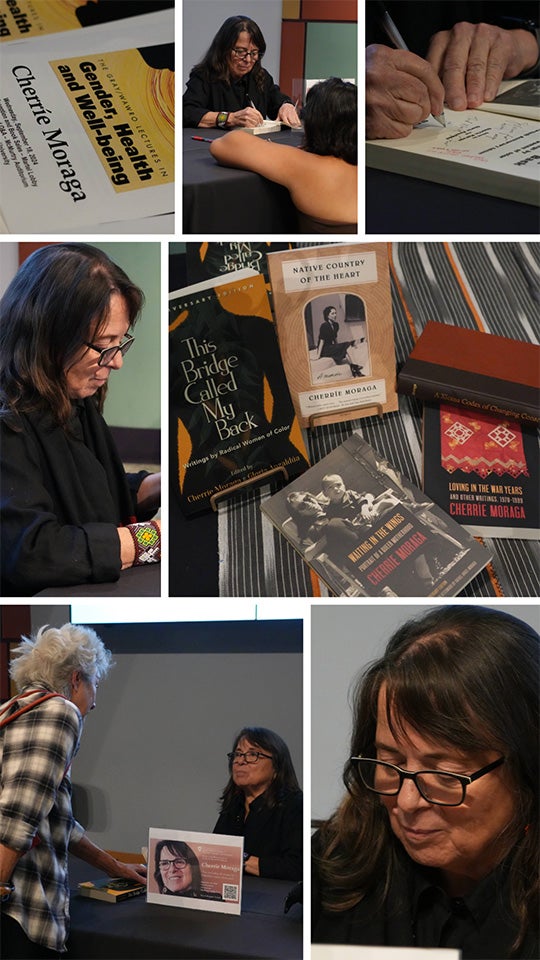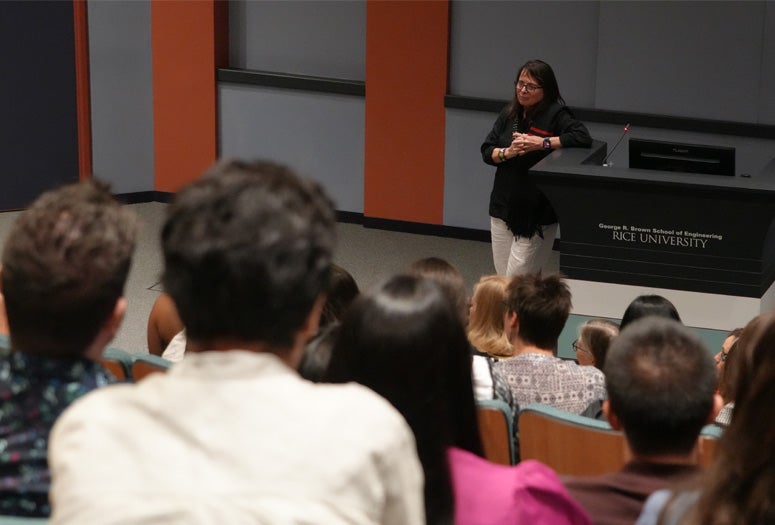
Weaving together reflections on colonization and her family’s experiences in California, Cherríe Moraga recounted how over centuries the violence of colonization has shaped the state and its people in her new piece, “They Are Falling All Around Me — A Borderless América Reimagined.” The woman of color activist, author and co-editor of “This Bridge Called My Back,” presented the work for the first time publicly Sept. 18 as a Gray/Wawro Lecture at Rice University. Moraga writes as a Xicana, a reworking of “Chicana” or “Latina” for all genders that foregrounds indigeneity.
Moraga was introduced by associate teaching professor of Spanish Luziris Pineda Turi, who also serves as associate vice provost for diversity, equity and inclusion. Turi reflected on Moraga’s profound impact on Chicana and Latine scholars as well as on their own personal journey.
“As a first-generation/limited-income Mexicana-Hondureña graduate student pursuing a Ph.D. in Spanish literature, I was lost and alienated, surrounded by middle- and upper-class white Latin American classmates whose theoretical and philosophical references did not connect with me,” Turi said. “But a graduate course in the English department introduced me to queer Chicana feminist studies, and my intellectual and personal life was forever changed by Cherríe Moraga and Gloria Anzaldúa’s ‘This Bridge Called My Back.’”

Turi highlighted Moraga’s work as foundational for understanding intersectionality and how it illustrated intellectual coalitions that embraced diverse identities.
“Before I even uttered or understood the word intersectionality … Moraga and ‘This Bridge Called My Back’ modeled what an intellectual coalition of diverse backgrounds could look like and its power,” Turi said, crediting Moraga’s critical theory and creative writing for offering a path forward in both personal and academic pursuits. “Today’s social struggles and academic pursuits situated in Chicana/Latine studies stand on the shoulders of giants like Moraga and their coalition building, critical analysis and the development of radical frameworks for activism.”
Moraga opened her lecture, the title of which is a reference to a song by a cappella ensemble Sweet Honey in the Rock, by reflecting on her transition away from a four-decade career of teaching. Newly retired, she is professor emerita of English at the University of California at Santa Barbara.
“I’m really working on liberation as much as possible,” Moraga said, framing the evolution of her work in the context of personal and political freedom. “That liberation process, to me, has to do with trying to write differently .... There’s always the sense in writing that you’ve got to break the mold.”
Moraga highlighted the devastating impact of colonization, including the deaths of up to 80% of Native Californians between 1846 and 1873 during the period of gold rush exploitation. Moraga argued this history continues to influence the present-day marginalization of Mexicans and Native peoples in California.
“California was mestizo in the beginning of so-called Spanish occupation,” Moraga said. “The first colonizers to arrive to the De Anza Pass were Spanish, yes, but they were few. The rest of their crew were African and indigenous and mestizo in ethnicity and stayed for the duration. How was it then that Black and Indian disappeared historically?”
Moraga’s exploration of colonization is deeply personal. She tied the history of California’s exploitation to her own familial experiences, sharing poignant reflections on the death of her father, Papa Joe, a white man who married into a lineage of Mexican and Indigenous peoples.
“He is no longer up to the task of all that holding in and on the cover of organ, vein, bone and gut,” Moraga said. “His dying is ordinary and in this way singular, seamless, quiet.”
In this intimate portrait, Moraga situated her father within the broader context of working-class California. He was a World War II veteran, a union man and a railroad worker — a quintessential American story. Yet through his marriage, Papa Joe became connected to a history shaped by colonization and migration, embodying the complex layers of identity that are central to Moraga’s interrogation of California’s past and future.
“My California dreaming was a 1970s extended lesbian moment, the freest I’ve known,” Moraga said, noting that even this freedom came with challenges. “It took years to make home with it, to allow myself citizenship without title, wearing the battered badge of half-breed and queer.”

As the lecture progressed, Moraga’s reflections on California’s history expanded into a broader critique of the United States’ treatment of marginalized communities. She voiced concerns about the future of the nation, particularly in relation to climate change, immigration and globalization.
“Does the U.S. truly imagine it can possibly survive the disappearance of the Amazon forest?” Moraga said. “How long can the U.S. continue the charade of stopping mass migration at the border of the very people dispossessed by U.S. intervention in their home countries?”
In the piece, Moraga said she sees the rise of a revitalized Chicano/a movement as a potential path forward.
“I’m interested in a revitalized movement de la raza. I use the word intentionally because it’s not gendered and it means race,” she said.
Moraga explained that to her, the term “raza” encompasses a wide coalition of mestizo, indigenous, Afro Latinos, immigrants and others who are resisting cultural erasure. In her view, this movement could provide the necessary framework for Latine peoples to build a progressive presence in the United States that would impact not only the U.S. but also the nations of their origins.
At the heart of Moraga’s vision is a deep commitment to remembering and reimagining.
“Maybe my work is simply shuffling these words, at times like Scrabble tiles, around on the page while my crooked fingers dig at something about remembering where the real veins of gold once ran,” she said. For Moraga, this act of remembering is crucial not only for understanding the past but also for shaping the future.
As Moraga closed her reading, she left the audience with a poignant reminder that history, no matter how painful, must be confronted and reimagined to create a more just and equitable future.
“I started and end these reflections with these same questions,” Moraga said. “And now we continue to imagine.”
This event was a Gray/Wawro Lecture in Gender, Health and Well-being hosted by the Center for the Study of Women, Gender and Sexuality. The 14-year-old lecture series is made possible by the generous support of Melanie Gray and Mark Wawro.

